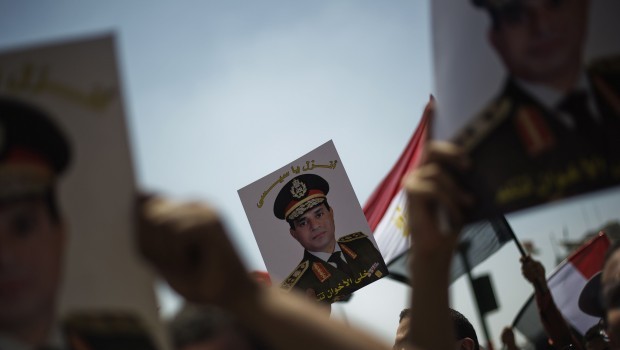The expression “military rule” is often associated with unpleasant ruling models in the Arab world. It has been associated with oppression, tyranny and despotism, and has produced terrible rulers who subjected their people and countries to incredible level of humiliation. Syrians well remember the series of military coups d’état started by Husni Al-Za’im, which continued until Hafez Al-Assad, a member of the military, seized power.
Under him and his son, Bashar Al-Assad, Syria entered a pitch-black tunnel, and the military became a brutal machine. Therefore, it will not be a surprise to see it murder people in the thousands using the most horrible of methods. Moreover, it continues to use “protecting the homeland” as a slogan.
Iraq has also had its share of military rule. It started with Abd Al-Karim Qasim, who did not remain in power for a long time; however, he opened the door to others.
In Libya, Muammar Gaddafi’s rule was like a never-ending circus and a pitch-black night.
Sudan also suffered for a long timeunder the rule of Gaafar Nimeiry. However, Abdel Rahman Swar Al-Dahab, the great golden man in the history of Sudan, was a noble military man, for he toppled Nimeiry and handed over power after one year, exactly as he promised.
The military ruled the country even in Algeria, but from behind the scenes.
In Yemen, all rulers imposed tyranny, from Abdullah Al-Sallal and Ibrahim Al-Hamdi to Ahmed Al-Ghashmi and Ali Abdullah Saleh.
Of course, there is also the important model of Egypt. When the military came to power after 1952 military coup d’état, Egypt came under the rule of Muhammad Naguib, the quiet and dignified person whom Gamal Abdel Nasser suddenly isolated in a bid to monopolize power, starting a despotic era in Egypt governed by fire, iron and prisons.
With the advent of Sadat, many military figures ruled Egypt, including Ahmad Ismail, Mohamed Abdel Ghani El-Gamasy, Hosni Mubarak, Mohamed Hussein Tantawi and Sami Anan, each of whom left an imprint, be it positive or negative.
Egyptians feel a special passion for their military institution, holding it in trust and veneration. A new star has come whose name will go down in the political history of Egypt, namely Field Marshal Abdel-Fattah El-Sisi, Egypt’s defense minister. In an extraordinary move, El-Sisi supported the decision of the Egyptians amassed in the streets and squares of Egypt demanding the removal of Mohamed Mursi, who has lost his legitimacy in Egyptian eyes.
El-Sisi implemented a highly effective strategy to protect the country by cordoning off the borders, arresting armed gangs plotting to sabotage more than 26 locations across Egypt, and defending the state TV building and other key locations in Cairo and the rest of the Egyptian provinces. Besides this, he consulted with all political factions and legislators before he issued the statement.
When El-Sisi read his statement, he was flanked by prominent figures in Egypt, such as the Al-Azhar sheikh, Pope Tawadros II, and other old and young figures, in an attempt to reflect the true face of Egypt. By doing so, he conveyed to people that this is not a coup d’état, but rather an attempt to return the revolution to those who ignited it so that they could complete and correct it after it was hijacked by the brotherhood.
The interim president of Egypt was sworn in in a civilized and appropriate manner. He also made a brief, but highly patriotic, speech.
God has endowed El-Sisi with the Egyptians’ love. In fact, El-Sisi brought a true legitimacy to Egypt, which will open the door to hope after a period of pointlessness, immaturity and distress. El-Sisi will go down in history and has gained the love of people.

كلكم كلاب تدافعون عن بعظكم البعض يا عملاء اليهود نسال العلي القدير ان يرينا فيكم يوما اسودا يا كلاب اليهود